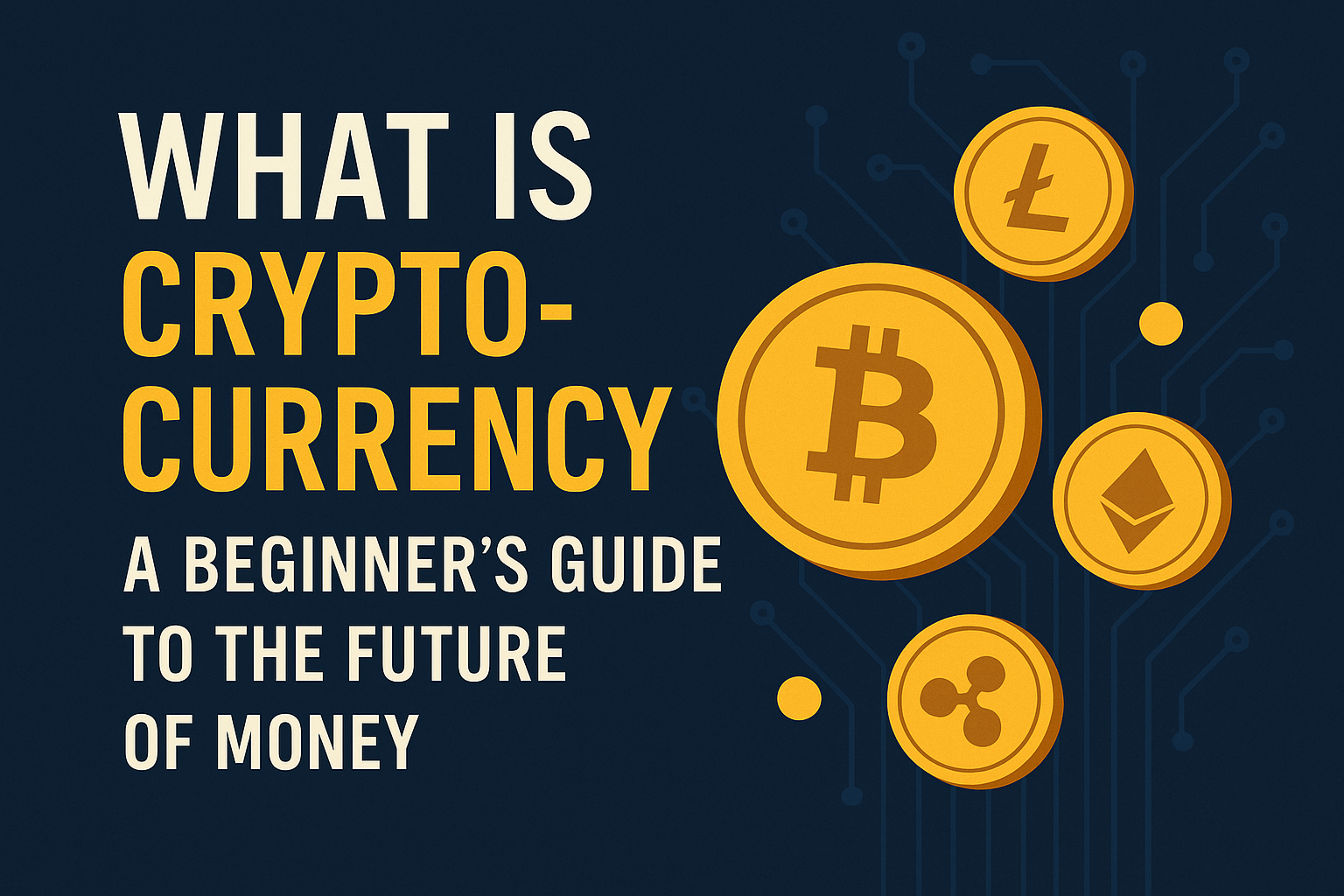Cryptocurrency is one of the most talked-about innovations in the world today. Whether it’s Bitcoin making headlines, NFTs breaking auction records, or governments discussing digital currencies, crypto has become more than a buzzword—it’s a revolution.
But if you’re new to the crypto world, it can feel overwhelming. What even is a cryptocurrency? How does it work? And should you invest in it?
This beginner’s guide breaks it all down in simple language—no tech jargon, no hype. Just the core concepts you need to know about the future of digital money.
🔍 What Is Cryptocurrency?
Cryptocurrency is a form of digital or virtual money that uses cryptography for security. Unlike traditional currencies like the dollar or euro, cryptocurrencies are decentralized and typically operate on blockchain technology.
The most well-known cryptocurrency is Bitcoin, but there are thousands of others, including Ethereum, Litecoin, and Solana.
🧱 How Does Cryptocurrency Work?
At its core, cryptocurrency is a system that allows people to send or receive money without needing a bank or government as a middleman.
Here’s how it works:
- Blockchain Technology
All transactions are recorded on a public digital ledger called a blockchain. Think of it as a spreadsheet that everyone can see but no one can erase or edit dishonestly. - Decentralization
Cryptocurrencies are typically not controlled by any one person or institution. Instead, they run on a network of computers (called nodes) around the world. - Mining and Validators
Some cryptocurrencies (like Bitcoin) use a process called mining, where computers solve complex puzzles to validate transactions. Others (like Ethereum 2.0) use proof-of-stake, where validators earn rewards for confirming transactions based on how much crypto they “stake.”
🪙 Popular Cryptocurrencies
Here are a few of the most notable cryptos:
1. Bitcoin (BTC)
The original cryptocurrency, created in 2009 by an unknown person or group using the name Satoshi Nakamoto. Bitcoin is often compared to digital gold.
2. Ethereum (ETH)
More than just a currency, Ethereum is a smart contract platform that allows developers to build decentralized apps (dApps).
3. Tether (USDT)
A stablecoin—its value is pegged to a real-world currency (like the U.S. dollar), making it less volatile.
4. Solana (SOL)
Known for high-speed transactions and low fees, popular among NFT and DeFi developers.
5. Ripple (XRP)
Designed for fast, low-cost international payments—often used by banks and financial institutions.
💼 What Can You Do With Cryptocurrency?
1. Buy and Sell
You can buy crypto using fiat currency (like INR or USD) through exchanges like Binance, CoinDCX, or Coinbase.
2. Invest
Many people buy crypto as a long-term investment, hoping its value will rise.
3. Trade
Others trade crypto frequently, trying to profit from price swings.
4. Make Payments
Some merchants accept crypto payments for goods and services.
5. Use dApps and NFTs
Ethereum and similar platforms allow users to interact with decentralized apps and buy NFTs (digital collectibles).
📈 Why Are People Investing in Cryptocurrency?
- High return potential (some coins have skyrocketed in value)
- Decentralization means no government control
- Inflation hedge during uncertain economic times
- Access to global financial tools without a bank account
- Innovation—blockchain is changing industries like gaming, finance, and supply chains
But remember: crypto investing is risky and volatile. Do your own research (DYOR).
⚠️ Risks of Cryptocurrency
It’s not all gains and Lamborghinis. Cryptocurrency comes with real risks:
1. Volatility
Prices can rise or crash dramatically in hours.
2. Security
If you lose your private keys (or get hacked), your crypto is gone.
3. Regulation
Governments around the world are still figuring out how to regulate crypto.
4. Scams and Rug Pulls
Not every crypto project is legit—many investors have been tricked by fake tokens or hacked exchanges.
🔒 How to Keep Your Crypto Safe
- Use trusted wallets (hardware wallets like Ledger or Trezor are safest)
- Enable 2FA on your accounts
- Avoid phishing links and emails
- Store your private keys offline
- Don’t share your seed phrase—ever
 Crypto in India: What’s the Situation?
Crypto in India: What’s the Situation?
India’s stance on crypto has been evolving. While crypto is not banned, it’s also not fully regulated.
- The Crypto Bill is still pending in Parliament
- The RBI warns of risks but hasn’t outlawed crypto
- Investors must now pay 30% tax on crypto profits and 1% TDS on transactions
Still, platforms like CoinSwitch, WazirX, and CoinDCX are seeing huge growth among Indian users.
💰 How to Get Started with Cryptocurrency
If you’re a beginner, here’s a simple path:
- Choose a Crypto Exchange
- India: CoinDCX, WazirX, ZebPay
- Global: Binance, Coinbase, Kraken
- Complete KYC
Most platforms require ID verification. - Deposit Funds
Link your bank account or UPI and deposit INR. - Buy Cryptocurrency
Start with Bitcoin or Ethereum—widely used and more stable. - Store in a Wallet
For large amounts, move your crypto to a non-custodial wallet.
Start small. Only invest what you can afford to lose.
📊 Is Crypto the Future of Money?
Opinions differ. Some believe it’s the next internet—disrupting how we exchange value. Others see it as a speculative bubble. But no one can deny that blockchain and crypto are changing finance forever.
- Governments are exploring CBDCs (Central Bank Digital Currencies)
- Companies like Tesla, PayPal, and Visa are embracing crypto
- Web3, the decentralized internet, is being built on blockchain tech
Whether you’re a fan or a skeptic, one thing is clear: crypto is here to stay.
🧠 Final Thoughts
Cryptocurrency is complex, but it doesn’t have to be confusing. It’s a mix of technology, economics, and social change. While it’s not risk-free, it’s worth learning—because understanding crypto today might be like learning about the internet in the 1990s.
If you’re curious, start small, read a lot, ask questions, and explore. The world of cryptocurrency is just getting started—and there’s room for everyone.
🙋♀️ Frequently Asked Questions (FAQ)
1. Is cryptocurrency legal in India?
Yes, but it’s not regulated. You can trade crypto, but profits are taxed at 30%.
2. Which crypto should I buy as a beginner?
Bitcoin (BTC) and Ethereum (ETH) are good starting points. Stick to well-established coins.
3. Do I need a wallet to start?
Exchanges provide wallets, but for better security, consider using your own wallet like MetaMask or a hardware wallet.
4. Can I lose all my money in crypto?
Yes, especially if you invest in unknown coins or fall for scams. Only invest what you can afford to lose.
5. Is crypto a good long-term investment?
It can be, but it’s highly volatile. Diversify your portfolio and do your own research.





